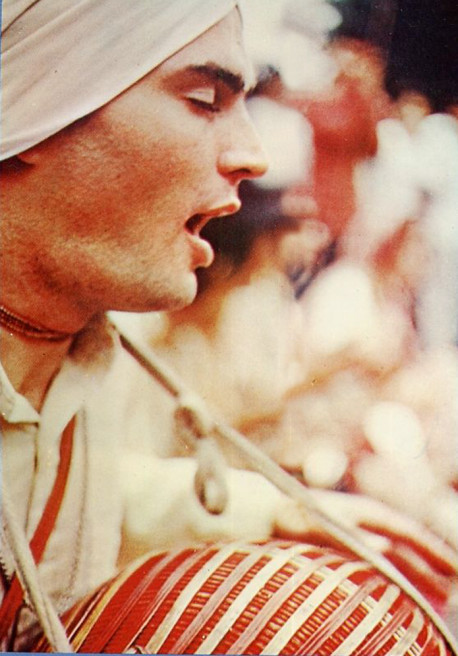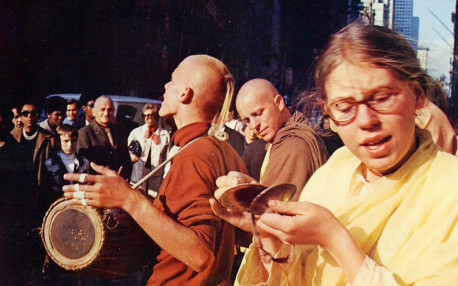by Kurusrestha dasa Adhikari
(ISKCON—Boulder)
For the soul there is never birth or death. Nor having once been does he ever cease to be. He is unborn, eternal, ever-existing, undying and primeval. He is not slain when the body is slain. (Bhagavad-gita 2.20)
Eternity—it is our nature to experience unceasing existence. Krsna explains in Bhagavad-gita that there never was a time when we did not exist and that therefore we were never born. Nor in the future will we ever die; we are eternally existing personalities untouched by the death of the body which encases our spirit. Our eternal nature is called the spirit self; this is our real identity.
One aspect of this eternal nature of ours its that we cannot exist without rendering some service to someone or something. We are eternally servants; this is also our nature. Upon hearing this, many of us become insulted and say, “No! I am free!” But if we examine our lives a little more closely we will see that it is true that we must always serve.
Firstly, we all serve these bodies and the unending stream of desires that accompany them. We feed them, wash them, decorate them, stimulate their senses, fix them when they are broken, and put them to bed when they are tired. So this is the most obvious example of our serving nature. We also serve a myriad of other masters, including parents, friends teachers, governments, pets, children, lawns, cars, etc. We are all rendering service in one way or another. This eternal nature of rendering service is called sanatana-dharma, which means the eternal religion of the living entity—”that quality which remains always and which cannot be taken away.”
Since we are all eternally servants, we should be interested to find out who is the most merciful and benevolent master and in whose service we will be most satisfied.
Krsna explains in Bhagavad-gita, Chapter Seven, verse six, that He is the “origin and dissolution” of all energy. Everything that we receive and give away has its origin in the Supreme Lord. So whether or not we recognize this fact, Krsna is already giving us everything, and therefore He is the most benevolent of all masters. Our most natural position, therefore, is to render service to Him.
When the Supreme Lord appears in the material world, He does so in His original, eternal, transcendental form, which always remains untouched by the illusory material energy. This is confirmed in Chapter Four, verse six, of Bhagavad-gita, where Krsna says:
Although I am unborn and My transcendental body never deteriorates, and although I am the Lord of all sentient beings, I still appear in every millennium in My original transcendental form.
Krsna is eternally a person, and this personality is the source of all energy, both material and spiritual. This fact is confirmed in all the Vedic scriptures, especially in Bhagavad-gita, Srimad-Bhagavatam and Sri Isopanisad. His form is completely spiritual, and the nature of this form is sac-cid-ananda-vigraha: it is eternally full of knowledge and bliss.
Therefore another aspect of our eternal nature is that we also have sac-cid-ananda forms. In Bhagavad-gita (15.7) Krsna says that we are eternally His fragmental parts. As parts and parcels of the Supreme Lord, we enjoy qualitative oneness with the Lord. So just as Krsna’s nature is eternally full of bliss and knowledge, it is also our nature to he eternally full of bliss and knowledge. But whereas Krsna possesses these qualities infinitely, we possess them infinitesimally. Thus there is a quantitative difference.
Asking The Question
His Divine Grace A.C. Bhaktivedanta Swami Prabhupada has given a nice example in this connection. The nature or quality of sea water is that it is salty. Whether one examines an entire ocean of sea water or just one drop, this quality of saltiness does not change; both the drop and the ocean are salty. The difference is in the quantity of sea water, not in the quality.
The question now comes to mind, “If we are by nature full of bliss and knowledge, why are we experiencing something temporary and miserable?” Everyone should ask this most important question; otherwise he has not actually reached the human form of life. This human form of life is meant for solving this question. Every activity we perform which is not directed at solving this question is simply a waste of time. It is not an extremely difficult question either, if we simply take the time to examine it.
The most prominent reason for failing to experience our real nature of eternity, bliss and knowledge is that we have a body which 1) exists only temporarily, 2) is completely unconscious, and 3) is always either partially or completely miserable. This body is produced of material nature, and these three aspects are qualities of the material energy.
The Supreme Lord expands Himself into infinite energies, which can generally be divided into three groups. One energy, which we have previously described, is called the superior, spiritual energy of the Lord. Another energy is the lower, inferior energy, called matter. And our nature is called marginal because we are one of the superior energies of the Lord but are now in contact with the inferior, material energy.
In Bhagavad-gita Lord Krsna describes this material energy:
Earth, water, fire, air, ether, mind, intelligence, and false ego—altogether these eight comprise My separated material energies. (Bg. 7.4)
This material form of energy is the exact opposite of the superior energy and therefore has the quality of being temporary. This fact can be easily understood if wee just examine the history of our father or our father’s father. Some of us have seen pictures of them when they were young, and then again when they were married, and then again when they were old. And now many of these persons have died, and their bodies are rotting. So the body is temporary, and all the different forms which it takes are also temporary.
The next quality of the material energy is that it is not conscious. This material world is nothing but a great lump of dead, ignorant energy which lacks the capacity for movement or awareness. This fact can he observed in these material bodies. As long as the superior energy is situated within the body, there is motion and consciousness. But at the point of death, when the spiritual living entity or life force leaves the body, suddenly the movement and consciousness which were present also leave the body. At this point we can see that the material elements of which the body consists have nothing to do with consciousness; these bodies are completely unconscious.
The third quality of the material energy is that it is full of unhappiness. In Bhagavad-gita Krsna mentions this fact:
From the highest planet in the material world, down to the lowest, all are places of misery, where repeated birth and death take place. (Bg. 8.16)
No matter which position one holds within this entire material world—whether one is rich, famous, beautiful or talented—he must be miserable here. That is the nature of this place. It is full of miseries; it is a place for suffering.
Miseries Attack
In Bhagavad-gita it is stated that the spiritual energy (internal) is covered by the material energy (external). It is this covering of material energy that is the cause of all miseries and sufferings. It is our natural position to experience full pleasure and knowledge. In Teachings of Lord Caitanya it is said that the more we identify with and are attached to this covering, the greater is the degree of our suffering. In the material world, “those who are a little enlightened suffer less, but on the whole, everyone is subjected to material misery due to being covered by the material energy.” (TLC, pg. 50)
The miseries which attack these material bodies are from three main sources: 1) from the very nature of the body, 2) from the nature of the environment, and 3) from other living entities.
These bodies are under the stringent laws of material nature, and this nature is undergoing a continuous process of transformation. We have all noticed the seasonal changes and have heard them glorified in various literatures. The entire material nature, including these bodies, must always evolve through six stages of existence: 1) birth, 2) growth, 3) duration of life, 4) transformation, 5) deterioration or old age, and finally 6) death. Nowhere in the entire material world is anyone free from this cycle of birth and death.
The first source of misery is contact with these material bodies. These bodies are always suffering in so many ways, but due to the illusory nature of the material energy, we sometimes think that we are enjoying. In Teachings of Lord Caitanya our existence in this material world is compared to sitting on a dunking seat: “Formerly a king used to punish a criminal by dunking him in the river, and then raising him again for a breath, and then again dunking him once more in the water. Material nature punishes and rewards the individual entity in just the same way.” Sometimes we are above water and it seems that we are enjoying, and sometimes we are submerged and therefore suffering. Neither position is very desirable. Every embodied being goes through birth, death, disease and old age due to this material body. If we identify with this birth and death cycle, we are immediately placed upon the dunking stool, sometimes up and sometimes down.
The environment in which these bodies live is the second source of material misery. Sometimes the weather is too hot, and sometimes too cold. Portions of the planet have no rainfall at any time during the year, whereas in other places it rains every day. These bodies are very delicate and are constantly being cut, bruised, broken or smashed by different calamities within the environment. It is impossible to make these bodies completely comfortable at all times within this material environment.
Finally there are those miseries inflicted upon these bodies by other living entities. Examples of this are the insects such as mosquitoes, lice and poisonous spiders. On a larger scale there are snakes and other wild or tame animals: even dogs and cats may sometimes inflict pain upon us. In human society the continuous wars that we are fighting is a great example of misery from other living entities. Thousands of men, women, children and other living entities have been maimed or destroyed by the weapons of war.
Thus the entire material world is full of intense danger in the form of the threefold miseries.
Place Of Danger
His Divine Grace A.C. Bhaktivedanta Swami Prabhupada has said that if someone were invited to an apartment where he knew there would be the danger that he might lose his life, then naturally he wouldn’t go there. Similarly, these bodies are places of great danger. Why are we accepting them? It is obvious that these bodies are causes of misery, danger and suffering, and they only prevent us from experiencing our eternally joyous and cognizant nature. Since this is true, why have we decided to take these bodies? Also, what is the process of liberation from them?
Krsna Himself says in Bhagavad-gita:
An intelligent person does not take part in the sources of misery, which are due to contact with the material senses. O son of Kunti, such pleasures have a beginning and an end, and so the wise man does not delight in them. (Bg. 5.22)
Intelligence is, as stated by the Supreme Personality of Godhead, the prerequisite for deciding not to take a material body. This intelligence is described by His Divine Grace A.C. Bhaktivedanta Swami Prabhupada as “the power to analyze things in their proper perspective.” If we understand that the contact with the senses of the material body is the source of our suffering, then we have the proper perspective described as intelligence.
Intelligence is necessary in order to understand the difference between matter and spirit and to become aware of the incompatible situation which occurs when they come in contact. “When one fails to take advantage of intelligence he becomes a deranged man, so a living being is dependent on intelligence, or the direction of a superior being.” (Bhag. 2.2.35, purport) The process by which we become trapped in this illusory consciousness and subsequently lose intelligence is also clearly described in Bhagavad-gita:
While contemplating the objects of the senses, a person develops attachment for them, and from such attachment lust develops, and from lust anger arises. From anger, delusion arises, and from delusion bewilderment of memory. When memory is bewildered, intelligence is lost, and when intelligence is lost one falls down again into the material pool. (Bg. 2.62-63)
When we fail to distinguish between spirit and matter and falsely think that we are these bodies or minds, then we are in ignorance of our true spiritual nature. “Ignorance is like animal existence. The animal’s life is full of suffering, but the animal does not know that he is suffering.” (Krsna, the Reservoir of Pleasure, pg. 10) It is due only to this ignorance of our true eternal nature that we suffer. We. have all forgotten that our natural position is to engage in loving service to the Supreme Lord, Sri Krsna.
There is a nice story in Teachings of Lord Caitanya in this connection. “The story involves the instruction of Sarvajna to a poor man who came to him to have his future told. When Sarvajna saw the horoscope of the poor man, he was astonished that the man was so poor, and he said to him, ‘Oh, why are you so unhappy? I see from your horoscope that you have some hidden treasure left to you by your father. The horoscope, however, states that your father could not disclose this to you because he died in a foreign place. But now you can search out the hidden treasure left by your father and be happy.’ ” (TLC, pg. 55)
Because of ignorance and forgetfulness of our true nature and of our relationship with Krsna, we continually take new material bodies, due to the force of our material consciousness.
That upon which a person meditates at the time of death, quitting his body absorbed in the thought thereof, that particular thing he attains after death. (Bg. 8.6)
If, therefore, one spends an entire lifetime thinking of material nature as experienced by the senses and the mind, what else can one think of at the point of death but material nature? Sri Isopanisad says:
Those who are engaged in the culture of nescient activities shall enter into the darkest region of ignorance. Worse still are those engaged in the so-called culture of knowledge. (Sri Isopanisad, Mantra Nine)
Within our modern civilization it can be said that a great percentage of the population is engaged in “the so-called culture of knowledge.” Today it is common for one to have a college degree, the standard symbol of education. But what kind of education is it which ignores our spiritual nature? Because we ignore our spiritual nature, we experience that instead of becoming happier, as modern science and education have promised, “… the result is that people are more unhappy than before on account of too much stress on material advancement without any taste of the most important aspect of life, the spiritual aspect.” (Sri Isopanisad, pg. 45)
The Solution
Modern education, which teaches how to manipulate and exploit material elements for an increase in sense gratification, is simply creating more and more problems rather than solving the original ones. “There is no need of machines and tools or huge steel plants for creating artificial comforts of life.” (Srimad-Bhagavatam 2.2.37, purport). We have seen the result of this kind of thinking—an environment which is so polluted chat it makes life intolerable rather than more comfortable. Rather than wasting time trying to lord it over this material nature, we should engage in finding a solution to the miseries of material life, namely birth, death, disease and old age.
“The miseries of the material world are also indirect reminders of incompatibility with dead matter, and intelligent living entities generally take note of these reminders and side by side engage themselves in the culture of vidya, or transcendental knowledge.” (Sri Isopanisad, pg. 56) This transcendental knowledge, as delivered by such literatures as Bhagavad-gita and Srimad-Bhagavatam, is the way to get out of this dark hole of material life. We are, by nature, eternally blissful and fully cognizant. The transcendental knowledge of Krsna consciousness is the way to revive that consciousness.
In this world, there is nothing so sublime and pure as transcendental knowledge. Such knowledge is the mature fruit of all mysticism. And one who has achieved this enjoys the self within himself in due course of time. (Bg. 4.38)
The Supreme Absolute Truth is the goal of such transcendental knowledge. Lord Krsna describes in Bhagavad-gita how to acquire this knowledge.
Just try to learn the truth by approaching a spiritual master. Inquire from him submissively and render service unto him. The self-realized soul can impart knowledge unto you because he has seen the truth. (Bg. 4.34)
When one is standing in the darkness of ignorance, which hangs like night over this material world, one cannot see in which direction to turn to get out of the darkness. One who is not blinded by the illusory energy can see and can also easily lead us across this ocean of birth and death. This is why the acceptance of a bona fide spiritual master is so essential for understanding which path to take to get out of the material entanglement.
There are undoubtedly many paths which lead in the direction of self-realization. In our present position it is very difficult to see which is the best, but we can get authorized knowledge from the transcendental Vedic literature. In the Srimad-Bhagavatam Sukadeva Gosvami tells King Pariksit:
For those who are wandering in the material universe, there is no more auspicious means of deliverance than that which is aimed at in the direct devotional service of Lord Krsna.
In all the Vedic scriptures this devotional service to the Supreme Lord Sri Krsna is recommended as the ultimate perfectional state of all existence. Krsna confirms this in Bhagavad-gita:
And of all yogis, he who abides in Me with great faith, worshiping Me in transcendental loving service, is the most intimately united with Me in yoga and is the highest of all. (Bg. 6.47)
Just by fixing one’s mind on the all-attractive transcendental form of Sri Krsna and engaging in His service, one immediately becomes free from all reactions to past activities and enjoys unlimited happiness, even within this life. Krsna is the reservoir of all pleasure and the only shelter from the pangs of material existence, and by becoming situated in pure Krsna consciousness one can be assured of never taking birth again in this miserable material world.
Only the purified soul can attain the perfection of associating with the Personality of Godhead in complete bliss and satisfaction, in his constitutional state, and whoever is able to renovate such devotional perfection is never again attracted by this material world, and he never returns. (Bhag. 2.2.31)
Purification: this is the only way one can end this material entanglement. In the Vedas there are thousands of sacrifices, rituals and mantras which can be performed to achieve this state of purified consciousness. In Teachings of Lord Caitanya it is said that Lord Caitanya, the highest perfectional figure in Krsna consciousness, quoted the following verse from the Brhan-naradiya Purana in this connection:
harer nama harer nama
harer namaiva kevalam.
kalau nasty eva nasty eva
nasty eva gatir anyatha.
In this age of quarrel and hypocrisy [Kali-yuga], the only means of deliverance is to chant the holy name of the Lord. There is no other means of success. (B.N. 38.126)
In this age, just by chanting and hearing the sound vibration of these sixteen words—Hare Krsna, Hare Krsna, Krsna Krsna, Hare Hare/ Hare Rama, Hare Rama, Rama Rama, Hare Hare—one can achieve the result of performing all the sacrifices and rituals prescribed in the Vedas for purification. In Teachings of Lord Caitanya it is stated, “To save oneself from the contamination of Kali (the present age) there is no other alternative than these sixteen words.





Leave a Reply